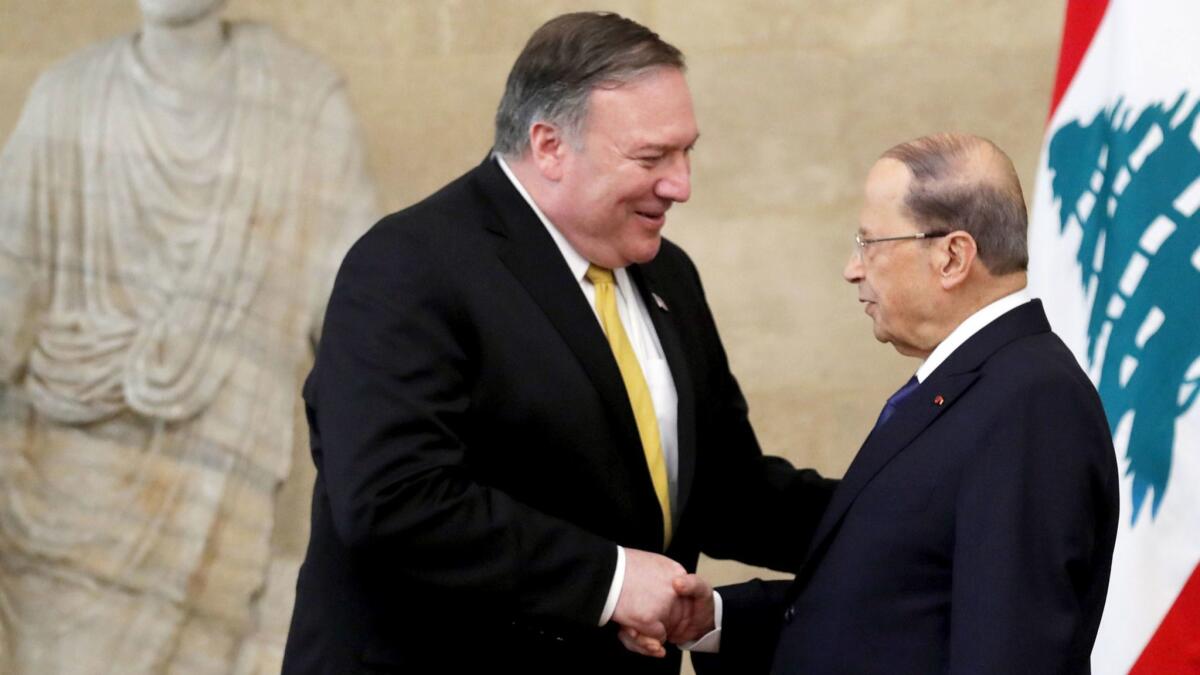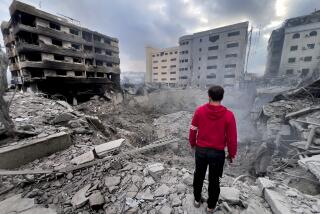Pompeo denounces Iran in Lebanon, even as he meets with its proxies

Reporting from Beirut — One day after President Trump signaled a change in U.S. policy certain to alienate Arab allies, America’s top diplomat traveled to Beirut on Friday to denounce Iran and urge that its proxies be removed from the Lebanese government.
Secretary of State Michael R. Pompeo had a complex mission on his hands: condemning the Iran-backed Hezbollah organization that he blames for regional violence while refusing to acknowledge its deep involvement in Lebanese government and society.
The visit to Lebanon was part of a three-day tour through the Middle East to rally forces against Iran, viewed by the Trump administration as an aggressive threat to Israel and peace.
A day before Pompeo’s arrival here, he stood at the side of Israeli Prime Minister Benjamin Netanyahu in Jerusalem as Trump reversed decades of U.S. policy and announced his intention to recognize Israeli sovereignty over the Golan Heights, a verdant, disputed region Israel seized from Syria during the Six-Day War in 1967.
From the archives, 1993: COLUMN ONE: Feeling Unsettled in Golan »
Israel annexed the Golan Heights in 1981. The U.N. Security Council, in a resolution supported by the United States, condemned the annexation as illegal.
The move to recognize Israeli dominion was seen as a major gift to Netanyahu, embroiled in a difficult campaign for reelection and facing possible indictment on corruption charges, and a step that will further isolate Washington in a world less avidly supportive of Israel.
It also gave opponents of the United States such as Iran and Syria added ammunition to mobilize their forces.
Even without Trump’s comments, Pompeo’s trip to Lebanon was not likely to be a friendly one. In recent days, he had made clear his top priority would be helping the government there “disconnect from the threat of Iran and Hezbollah.”
Hezbollah is a Lebanese Shiite party, supported by Iran, that the United States designated a terrorist group in 1997. But the group also represents a wide swath of Lebanon’s population, and has entrenched itself in the country’s social fabric ever since its beginnings in the Lebanese civil war in the 1980s.
“Hezbollah is a terrorist organization. You ask how tough I am going to be? It is a terrorist organization. Period. Full stop,” Pompeo said in Jerusalem on Thursday.
He refused to explain how he would navigate the complexity of Hezbollah’s presence in Lebanon and those who facilitated it, some of whom he was scheduled to meet with in Beirut.
Pompeo met Friday with Lebanese President Michel Aoun and Foreign Minister Gebran Bassil, both of whom have worked with Hezbollah politicians.
The U.S. envoy accused Hezbollah of using intimidation and election fraud to win the seats it has in parliament, and called on Lebanon to act against it.
“I expressed hope that the new Lebanese government will be able to meet the need of the Lebanese people,” he said. “We will not hesitate to call out those who actively and passively support those activities.”
Pompeo spoke as he met with Bassil, who is Aoun’s son-in-law and was instrumental in brokering a parliamentary alliance with Hezbollah.
In comments later, after Pompeo and his hosts declined to hold a news conference, Bassil said that Hezbollah was not a terrorist organization but a Lebanese party whose “parliamentarians are elected by the Lebanese people.” Any terrorist designation, he added, was the responsibility “of the country that issued it,” but the government would prioritize national unity.
The Lebanese government is concerned that any move to limit Hezbollah’s influence could destabilize the country’s always delicate detente among its 18 fractious sects, of which Hezbollah is the strongest.
“We do not want our relations with America to be affected,” Bassil said, “and we want to work together to solve these problems, including Hezbollah … because finally we consider Lebanon’s stability and the preservation of its national unity a Lebanese interest and a U.S. one.”
Last year’s elections gave the group additional power in parliament, which it used to assume control of the Health Ministry along with two other Cabinet positions.
The dynamic illustrates the complexity of relations in the Middle East, and the need for experienced diplomats. The State Department under Trump has lost many such experts.
Hezbollah’s armed wing is thought to be more powerful than the Lebanese army (which receives annual aid of $70 million from the U.S.), and is considered to be Iran’s most successful proxy. Along with Iran, its cadres have been instrumental in helping Syrian President Bashar Assad defeat his rebel adversaries, and Hezbollah operatives have appeared on battlefields in Yemen and Iraq.
Israel says Hezbollah is moving into a portion of the Golan Heights still controlled by Syria, potentially within striking distance of Israel.
The expansion has alarmed the Trump administration, and inspired a steady round of economic sanctions against Tehran, including another batch announced Friday that targeted 34 individuals and entities that the Treasury Department accused of supporting Iran’s now-dormant nuclear program.
Sanctions on Iran have already begun to bite into Hezbollah’s funds. Earlier this month, the group’s leader, Hassan Nasrallah, called for increased donations from Hezbollah’s supporters in Lebanon so as to guarantee the group’s victory in what he called a “financial war.”
Trump’s Golan decision, following his recognition last year of Jerusalem as Israel’s capital, also contravening international norms, renewed hostility to the U.S. in the Arab world.
Al Akhbar, a pro-Hezbollah Lebanese daily newspaper, put Pompeo on its front page Friday with the headline “The dirty Yankee … and his lackeys.” It said Trump’s words on the Golan Heights were proof to Lebanese politicians who wished “to hide their head in the lap of the American whore” that the U.S. cared about Israel’s interests more than those of its allies in the country.
Elsewhere, protests were held near the heavily fortified U.S. Embassy north of Beirut, while activists online urged people to fill the streets with demonstrators. No such crowds were visible from Pompeo’s motorcade.
Traffic on Beirut’s perpetually congested streets choked to a standstill amid heavy security arrangements for Pompeo’s last stop on his regional tour, and his first trip to Lebanon since becoming secretary of State.
Trump’s policies also complicate Pompeo’s mission by making it difficult for potential allies in the region reluctant to openly support U.S. plans, said Joe Macaron, a resident fellow at the Arab Center in Washington, in a phone interview on Friday.
“There’s a push to challenge the status quo in the administration here, but you have a political class that is not willing to clash with each other,” said Macaron.
“There is a focus on corruption. You have a severe economic crisis. All those factors are not conducive to this shift in U.S. policy.”
The Golan issue would be used by Hezbollah in its favor, said Macaron.
“This will add to the group’s narrative to justify their presence in Syria and the Iranian role there,” he said.
Bulos reported from Beirut and Wilkinson reported from Jerusalem.
More to Read
Sign up for Essential California
The most important California stories and recommendations in your inbox every morning.
You may occasionally receive promotional content from the Los Angeles Times.












